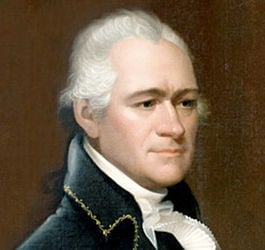The "Federalist Papers" - Put In Perspective - FP# 6, 7: The Problems of Disunion (cont)
War Between the States
FEDERALIST PAPERS 3 - 5 CONSIDER THE PROBLEM DISUNION brings from increasing the possibility of foreign conflicts, Papers 6 and 7 consider the problems multiple, adjacent sovereign nations raise regarding internecine warfare. Many arguments put forth against ratifying the Constitution centered around the idea that neighboring sovereign states who share common history, language, goals, and religion will naturally live in peace with one another. That the benefits of commerce would greatly outweigh any friction or discontent that may develop between in two sovereign states or sovereign small confederacies. It is well known active conflict will destroy everybody's economies, wealth, and property; so it only makes sense it is in each nations vital interest to avoid war.
This is exactly the rational being used by all nations prior to WW I. The developed world was enjoying the economic benefits of industrialization, from Great Britain to Russia. For any one or set of nations to go to war is self-defeating. To help assure this, various alliances were made where one country promised to come to the aid of another, if attacked (much like it was argued in 1787-88 what would happen between the States resulting from disunion). Unfortunately, those visions crumbled in the face of inflamed passions, national egos, misconceptions, and ethnic hatred. With the assassination of Archduke Ferdinand, WW I commenced.
ALEXANDER HAMILTON

FEDERALIST PAPER # 6 - Alexander Hamilton
CONCERNING DANGERS FROM DISSENSIONS BETWEEN THE STATES. Alexander Hamilton's whole theory regarding this particular issue with the following quote:
"A man must be far gone in Utopian speculations who can seriously doubt that, if these States should either be wholly disunited, or only united in partial confederacies, the subdivisions into which they might be thrown would have frequent and violent contests with each other"
That is Hamilton's contrarian argument to the popular one being offered by the anti-Federalists. He then proceeds to flesh out his thesis with example after example.
So why would nations battle each other to the detriment of all? Multiple reasons, large and small, temporary and permanent, rare and ubiquitous. The most permanent and everywhere present is the "love of power", "jealousy of power", or a desire for equality and safety. There are economic reasons as well when one considers rivalships and competition. Then you have "private passions, in the attachments, enmities, interests, hopes, and fears of leading individuals in the communities of which they are members". In the latter case, these men betray the trust put into them and no "scruples" about destroying his nation in the pursuit of "personal advantage or personal gratification".
For example, Pericles, complying with the wishes of a prostitute, attacked, vanquished, and destroyed the city of the Sammians. Or how about Cardinal Wolsey, prime minister to Henry VIII, who, wanting to further his quest for power, conspired with Emperor Charles V to precipitate a war between England and France. These kinds of examples continue.
Hamilton moves on to the idea that, as some claim, republican forms of government are not immune conflict, no matter how benevolent they may be to each other at any given time. Sparta, Athens, Rome, and Carthage were all republics, Hamilton points out, yet they were frequently at each other's throats in massive. bloody wars. Then he moves on to examples which are more current (relative to 1797). They would be Holland, going to war with Britain over command of the sea. Or consider the long, terrible war between the rival houses of Austria and Bourbon that consumed Europe, like forever. And the war between Britain and Spain was over commercial competition.
All of the above were picked because of their similarity, in one way or another, with the situation America would be in if it chooses some form of disunion. The point he strongly makes is that war between sovereign nations is almost inevitable.
FEDERALIST PAPER # 7
CONCERNING DANGERS FROM DISSENSIONS BETWEEN THE STATES (cont). Alexander Hamilton now continues the discussion by dissecting the particular reasons the disunited States might take up arms against each other, just as the neighboring sovereign nations in Europe did.
Territorial Disputes
Territorial disputes among the States has been and will always continue to be a source of conflict; even, to some extent to day; consider the California-Arizona water disputes. Hamilton maintains the potential enmity would be the future case as well as having already has been the source for past and on-going hostilities; hostilities, by the way, which constitute one of the principal reasons for the new constitution in the first place. The Continental Congress was able to dampen down those irritations brought about fighting over the expansive lands to the West by convincing the States to cede these lands to the National government. But, if the national government were to dissolve, then these irritations will, in all likelihood, blossom into full-fledged conflicts between the States.
Commerce
The main source of conflict would arise, however, from commerce when mixed with substantial differences between states as to population, size, wealth, geography, and the like. Even if states were equal in all respects when they began, very quickly one or another state or states would gain an advantage over the others. Once equality is broken, jealousies develop; the smaller/weaker states will envy the larger, more powerful ones, and the latter become aggressive in protecting and even expanding their gain.
This situation could easily lead to small states conspiring together against lager ones, maybe, as suggested in the previous essay, forming alliances with European trading partners. One such example is offered concerning New York taxing its two neighboring States:
"The opportunities which some States would have of rendering others tributary to them by commercial regulations would be impatiently submitted to by the tributary States. The relative situation of New York, Connecticut, and New Jersey would afford an example of this kind. New York, from the necessities of revenue, must lay duties on her importations. A great part of these duties must be paid by the inhabitants of the two other States in the capacity of consumers of what we import. New York would neither be willing nor able to forego this advantage. ... Would Connecticut and New Jersey long submit to be taxed by New York for her exclusive benefit? Should we be long permitted to remain in the quiet and undisturbed enjoyment of a metropolis, from the possession of which we derived an advantage so odious to our neighbors, and, in their opinion, so oppressive? Should we be able to preserve it against the incumbent weight of Connecticut on the one side, and the co-operating pressure of New Jersey on the other? These are questions that temerity alone will answer in the affirmative."
And this example is already being played out in Pennsylvania and Maryland through tolls to enter their borders. Another bone of contention Hamilton brings up, one that set him at great odds many years later with his co-author James Madison, was how the debts to France, The Netherlands, and others be equitably be paid off? Which states would pay what portion of the debt? What if some states, and some actually did, wanted to default on the debt owed to others? What if the larger, more powerful states, tried to force a settlement on smaller ones? These are many of the questions which would have to be resolved in the case of disunion. (The contest between Hamilton and Madison a decade later was whether to have the national government consolidate the debts and establish the First Bank of the United States to help manage the payments ... Hamilton's position ... or, as Madison wanted, portion out the debts between the States and the central government. This precipitating debate and its aftermath almost led to civil war in the late 1700s and early 1800s.)
Hamilton's Conclusions on this Subject
Alexander Hamilton concludes this section by referring back to the previous four essays with;
"From the view they [the States] have exhibited of this part of the subject, this conclusion is to be drawn, that America, if not connected at all, or only by the feeble tie of a simple league, offensive and defensive, would, by the operation of such jarring alliances, be gradually entangled in all the pernicious labyrinths of European politics and wars; and by the destructive contentions of the parts into which she was divided, would be likely to become a prey to the artifices and machinations of powers equally the enemies of them all. Divide et impera [divide and conquer] must be the motto of every nation that either hates or fears us. "
DEMOGRAPHIC SURVEY #1
Are You
DEMOGRAPHIC SURVEY #2
Politically Speaking, Do You Consider Yourself More Aligned With The
DEMOGRAPHIC SURVEY #3
Your Age Is
Related Links
- On Principle and Pragmatism II - Ratification of the...
Most Americans, including most Conservatives and Tea Party types, as well as Democrats, are not aware how close we came to not having an America at all. Roughly 50% of colonialists wanted something more like the what the European Union is today, exce
© 2016 Scott Belford







